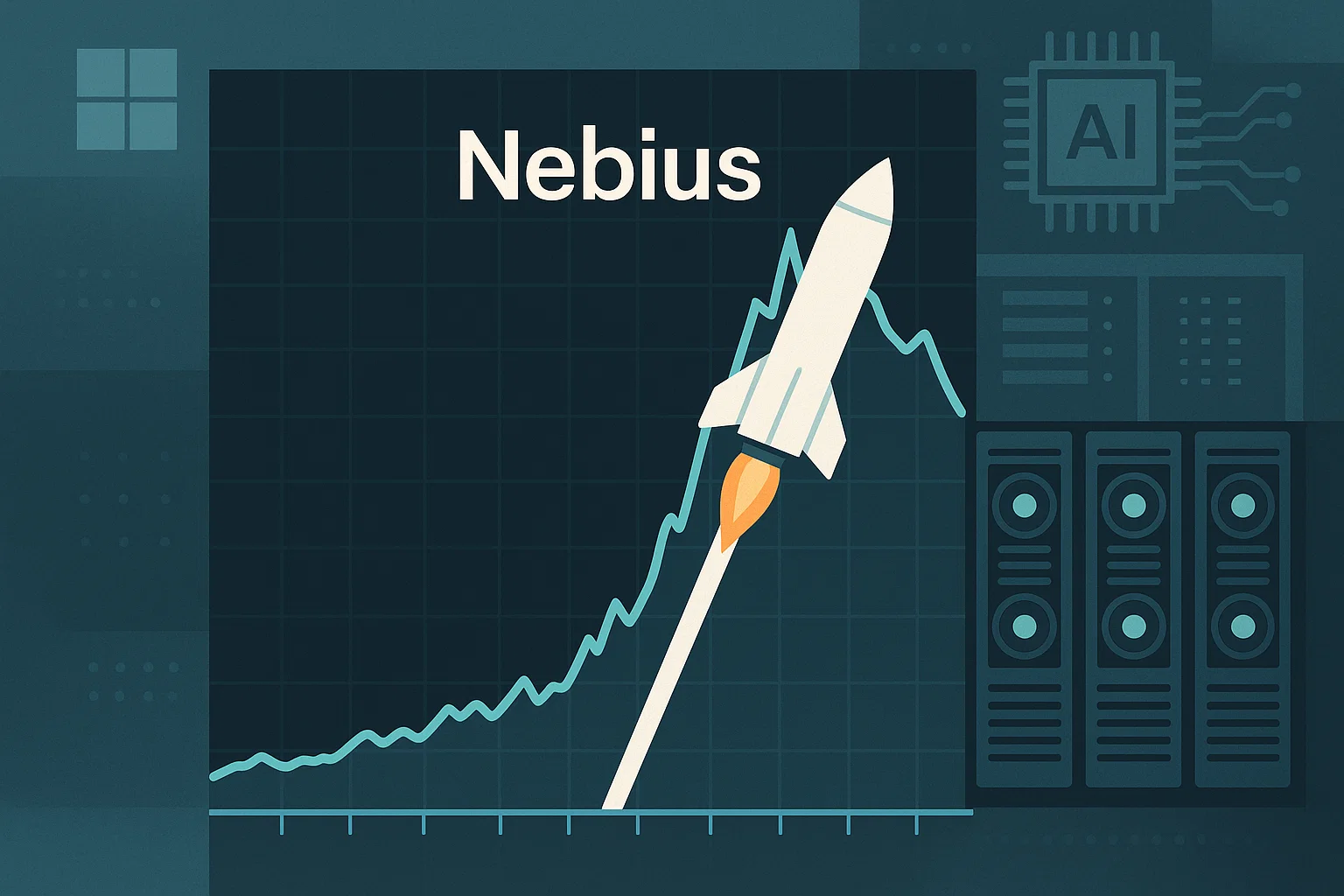Nebius stock pulls back after big run: is Microsoft partnership enough to sustain gains?

News Summary
Nebius (NASDAQ: NBIS) shares experienced a parabolic surge of over 900% from late 2024 to early October 2025, reaching a 52-week high of $141.10, before recently pulling back. This extraordinary rally was primarily fueled by a landmark multi-year contract with Microsoft, announced in early September 2025, valued at $17.4 billion with potential to expand to $19.4 billion, for dedicated GPU capacity through 2031. The deal immediately sent shares up nearly 50%. The company demonstrated strong operational momentum, reporting Q2 2025 revenue of $105.1 million, a 625% year-over-year increase, and achieving positive adjusted EBITDA in its core AI infrastructure business ahead of schedule. Management subsequently raised its annualized run-rate revenue (ARR) guidance to $900 million-$1.1 billion for the end of 2025. However, significant concerns have emerged regarding Nebius’s valuation and path to sustained profitability. The company currently trades at a price-to-sales ratio of approximately 28 and a P/E ratio of 123.35, suggesting extremely optimistic growth scenarios are priced in. Despite revenue explosion, Nebius remains unprofitable, reporting a net loss of $91.5 million in Q2 2025, widening year-over-year. Market observers fear Nebius exemplifies speculative excess in an AI bubble, with shares plunging 7.8% on October 17, 2025, amid negative headlines targeting unprofitable AI infrastructure companies.
Background
Nebius is an AI infrastructure provider focused on delivering GPU capacity. The company gained significant market attention and a soaring stock price in 2025 due to a landmark multi-year contract with Microsoft, valued between $17.4 billion and $19.4 billion, to deliver dedicated GPU capacity from its new data center in Vineland, New Jersey. This contract, extending through 2031, represents one of the largest AI infrastructure agreements. Despite operational progress, including exploding revenue and achieving positive adjusted EBITDA ahead of schedule, Nebius continues to face profitability challenges, reporting a net loss in Q2 2025.
In-Depth AI Insights
Is Microsoft's GPU contract with Nebius a strategic defense or a short-term boon? - On the surface, this is a proactive move by Microsoft to secure AI compute capacity. However, the sheer scale of up to $19.4 billion might also reflect the tight supply in the AI infrastructure market and Microsoft's critical emphasis on compute stability in the AI race. - While the contract provides strong revenue visibility for Nebius, its lofty valuation (28x P/S) suggests the market has already priced in many years of future growth, potentially limiting further upside. - For Microsoft, this could be a defensive strategy to reduce reliance on a single GPU vendor and diversify its supply chain risks, especially amidst growing geopolitical uncertainties. Do Nebius's profitability and high valuation signal an AI infrastructure bubble risk? - Nebius's net losses despite exploding revenue, coupled with a P/E ratio of 123.35, indicate irrational exuberance for 'AI concept stocks'. This disconnect between valuation and fundamentals is a recurring theme in historical tech bubbles. - The stock's 7.8% plunge on October 17, 2025, specifically targeting unprofitable AI infrastructure companies, could be a significant turning point in market sentiment. It might signal investors are beginning to shift from hype to focusing on actual profitability and sustainability. - The sustainability of such a high-valuation model is questionable. Should AI hype cool or competition intensify leading to margin pressure, companies like Nebius will face significant valuation corrections. Beyond the Microsoft contract, does Nebius possess sustainable competitive advantages and growth drivers? - While the Microsoft contract is substantial, its ability to translate into a diversified, lasting customer base is crucial. Over-reliance on a single giant customer, especially post-contract, could pose significant business risks. - Nebius needs to demonstrate unique competitive advantages in AI infrastructure build-out and operations, such as cost efficiency, technological leadership, or service flexibility. If it's merely providing generic GPU capacity, its pricing power and margins could erode as more competitors enter the market. - Given the rapid evolution of AI technology, the demands for GPU hardware and related services are constantly changing. Nebius's ability to innovate continuously and meet the advanced, complex compute requirements of future AI models will be key to its long-term growth.